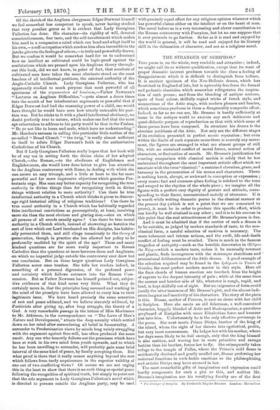THE STRANGER OF SERIPHOS.* Tuts poem is, on the whole,
very readable and attractive ; indeed, we might call its so without qualification, except that its want of proper dramatic interest produces towards the close a feeling of disappointment which it is difficult to distinguish from tedium. It is another specimen of the Neo-Hellenic drama, which has flourished in England of late, but is agreeably free from the formal and pedantic classiciim which somewhat refrigerates the inspira- tion of such poems ; and from the blending of antique notions, spots of local colour, skilfully copied tricks of Greek style, and mannerisms of the Attic stage, with modern phrases and fancies, which sometimes produces in them a disagreeably composite effect. Indeed, as far as we can see, Mr. Broome is hardly sufficiently at home in the antique world to execute any such deliberate and quasi-didactic purpose of reproduction as that with which some of these poems have been composed. In structure his drama is the absolute antithesis of the Attic. Not only are the different stages of its evolution presented in perfect scenic separation ; but even within the limits of each separate scene there is scarcely any move- ment, the figures are arranged in what are almost groups of atilt life, with no sustained conflict of moral forces, mutual action of characters, or fluctuation of moods. Mr. Broorne's justification for courting comparison with classical models is solely that he has maintained throughout the most important artistic effect which we associate with the term" classical :" a sustained elevation, grace, and harmony in the presentation of his scenes and characters. There is nothing harsh, abrupt, or awkward in conception or expression ; every coarse fact and common-place feeling is subdued to the tone and swayed to the rhythm of the whole piece ; we imagine all the figures with a perfect easy dignity of gesture and attitude, corre- sponding to their fluent, unconstrained melody of utterance. If it is worth while writing dramatic poems in the classical manner at the present day (which is not a point that we are concerned to prove), it must be in order to produce this specific effect, which can hardly be well attained in any other ; and it is to his success in this point that the real attractiveness of Mr. Broome's poem is due.
And it must be admitted that if the matter of such a drama is to be suitable, as judged by modern standards of taste, to the neo- classical form, a careful selection of motives is necessary. The more vehement and intense actions, and the swift, life-and-death conflict of feeling must be avoided. There is much in the famous tragedies of antiquity—such as the horrible discoveries in (Edipus the King—which a modern taste, unless it be unusually reverent and plastic, finds incongruous with the statuesque stateliness and ' processional deliberateness of the Attic drama. A good example of the selection required may be found in the Iphigenia in Tauris of Goethe, the most perfect modern master in this style. Here all the finer chords of human emotion are touched, from the height of rapture to the deepest intensity of pain ; while at the same time the coarser and harsher side of life, whatever is rough, rapid, and loud, is kept skilfully out of sight. But no exigencies of form could justify the utter tameness of Mr. Broome's plot, and the almost ludi- crous languor and inactivity of his characters. The story of the piece is this. Danae, mother of Perseus, is cast on shore with her child in Seriphos. Here she meets an old fisherman, a well-conceived character, happily blended of Attic and Shakespearian, a querulous greybeard of Euripides with some Elizabethan force and humour put into him. Unfortunately he is the only effective personage in the poem. She next meets Prince Dictys, brother of the king of the island, whom the sight of her throws into egotistical, prolix, but very inert amorousness. He lodges her with his mother, where her days seem likely to be dull enough, only that the king himself is also smitten, and wooing her in more primitive and savage fashion than his brother, forces her to fly. She subsequently takes refuge in the temple of Pallas, where the Prince's mild flame is accidentally disclosed and gently snuffed out, Danae preferring her maternal functions to such feeble emotions as the philosophizing and artistic Dictys may have aroused in her.
The most remarkable gifts of imagination and expression could hardly compensate for such a plot as this, and neither Mr. Broome's imagination nor his versifying faculty are of the first
• The Stranger of .seriphat By Frederick Napier Broome. London: Macmillan
































 Previous page
Previous page